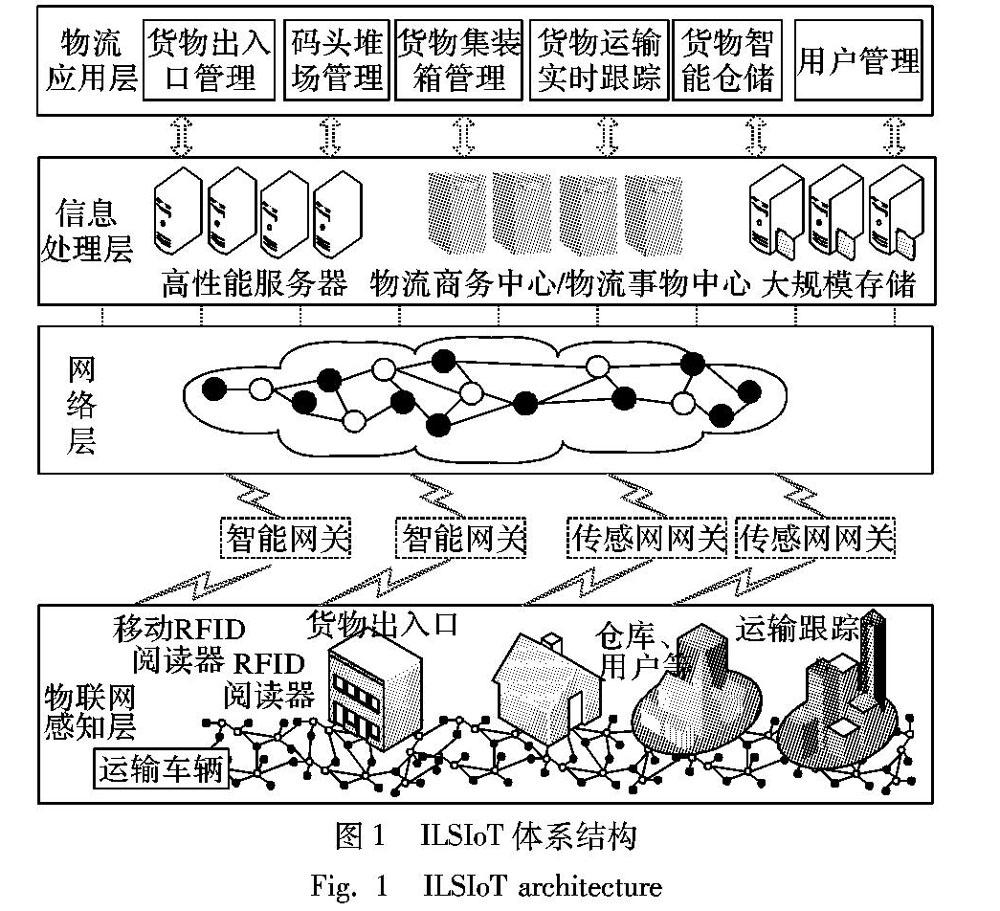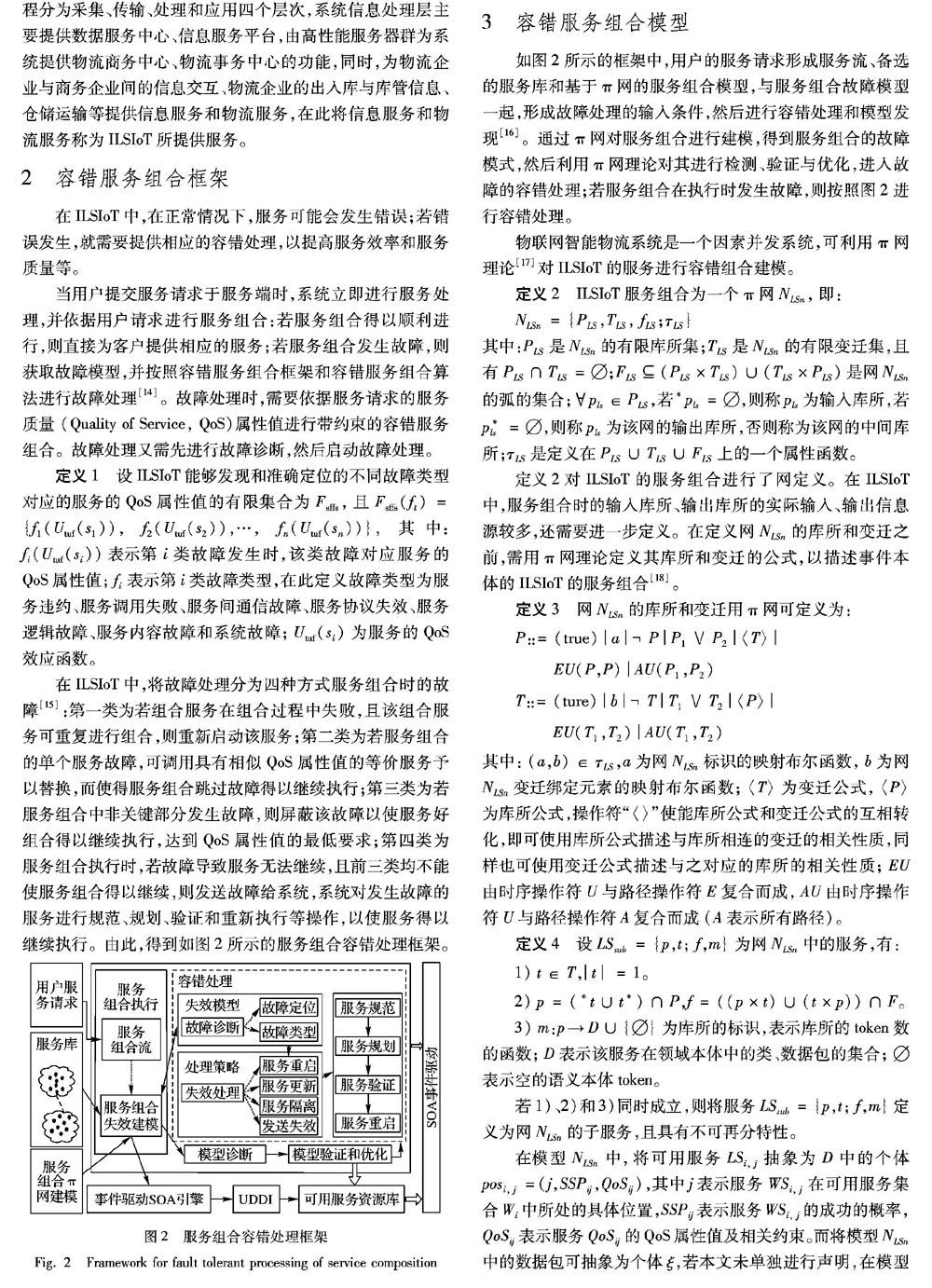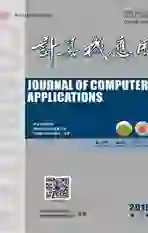物联网智能物流系统容错服务组合建模与分析
2019-08-01郭荣佐冯朝胜秦志光
郭荣佐 冯朝胜 秦志光



摘 要:针对物流领域的服务组合存在容错性差和服务不可靠等问题,提出一种基于π网的物联网智能物流系统物流服务容错组合模型。首先,在简单介绍物联网智能物流系统后,给出了物联网智能物流系统的容错服务组合框架;然后,基于π网建立了物联网智能物流系统物流服务容错组合模型,并对模型进行了容错正确性和拟合性分析;最后,对提出的模型进行了服务可靠性、服务故障容错可靠性实验,并与Petri网、QoS动态预测算法、模糊卡诺模型和改进粒子群优化的服务组合方法针对服务组合的执行时间、用户满意度、可靠性和最优度进行对比实验。实验结果表明,所提模型具有更高的服务可靠性和服务故障容错可靠性,同时在服务组合的执行时间、用户满意度、可靠性和最优度等方面也具有一定的优越性。
关键词:物联网;智能物流;容错服务组合;π网;建模与分析
中图分类号: TP311.5; TP301.2
文献标志码:A
Abstract: In order to solve the problem that the service composition in the logistics field has poor tolerance and unreliable service, a model of logistics service fault-tolerant composition for intelligent logistics system of Internet of Things (IoT) based on π-net was built. Firstly, after a brief introdution of IoT intelligent logistics system, a fault-tolerant service composition framework for the system was provided. Then, a model of logistics service fault-tolerant composition for the system based on π-net was built, and the correctness of fault tolerance and fitting degree of the model were analyzed. Finally, the service reliability and the fault-tolerant reliability of the model were tested, and the comparison with Petri-net, QoS (Quality of Service) dynamic prediction, fuzzy Kano model and modified particle swarm optimization methods in the service composition execution time, user satisfaction, reliability and optimal degree were carried out. The results show that the proposed model has high service reliability and fault-tolerant reliability, and has certain advantages in terms of service composition execution time, user satisfaction, reliability and optimal degree.
Key words: Internet of Things (IoT); intelligent logistics; fault tolerant service composition; π-net; modeling and analysis
0 引言
电子商务的迅速发展,使得物流业务得到跨越式发展。物流快速发展后,其服务不得不依赖于现代信息技术,以使物流发展为智能物流。如Amazon公司利用现代信息技术,为各大运转中心、配送、订单与客服、库管、智能拣货、智能调拨和定位与跟踪等提供全面智能化服务[1]。基于物联网技术的智能物流系统能够提高对订单的实时掌控和科学调配能力,从而提高对配送人员的监控与管理能力,并有助于提高物流效率和客户满意度等。物联网智能物流系统(Intelligent Logistics System of Internet of Things, ILSIoT)虽然能够提高物流效率,但还需要对其服务端的物流服务组合进行研究,特别是在物联网不稳定环境下研究其服务端的物流服务的组合问题。
国内外研究者们对Web服务组合和服务容错等进行了相关研究。如文献[2]概述了各种Web服务容错技术,包括容错策略设计、容错策略选择和复杂容错,并讨论了一种特殊类型的服务容错技术——Byzantine式容错;文献[3]对Web服务组合问题进行研究,提出了一种服务级协议 (Service Level Agreement, SLA)感知的事务型组合服务容错方法,并对其进行了实验验证;文献[4]提出了一个用于持久复合Web服务的Byzantine容错服务管理框架,该框架结合了基于仲裁和基于状态机的Byzantine容错协议来确保可靠的服务交付;文献[5]提出了Web服务常用容错策略的离散事件仿真算法,并对算法进行了可靠性分析和实验验证;文献[6]对Web服务进行研究,提出了一种基于自主计算的自反中间件体系结构来诊断服务组合中的故障,称为自主管理服务组合的反射中间件 (Autonomic management Reflective MIddleware for Service COMposition, ARMISCOM),并提出了相應的维修策略;文献[7]为提高动态物联网环境下物流服务满意度,利用传统Web服务组合思想,提出一种局部最优选择的物流服务选择方案来解决智能物流服务问题;文献[8]对Web服务组合框架进行了设计,提出了一种强大的Web服务组合框架。
以上研究集中在Web服务组合和服务容错的研究,但未针对智能物流容错服务组合问题进行研究。
还有研究者对物流、供应链等进行了研究。如文献[9]对供应链进行研究,提出了基于物联网服务的生态系统模型开发技术来开发供应链管理;文献[10]对物流自动化管理进行研究,提出了基于物联网射频识别(Radio Frequency Identification, RFID)技术的物流自动化管理软件原型;文献[11]对协同物流配送调度方法进行研究,提出了基于物联网和大数据的协同物流配送调度方法和云机器人系统;文献[12]利用中间件技术对智能物流进行研究,提出了一种解决物基于物联网的物流服务组合的中间件方法。
上述研究主要针对Web场景的Web服务端服务组合进行研究,例如文献[2-5]针对Web容错服务提出了Byzantine式和事务型算法,文献[6-8]对Web服务组合的故障诊断、智能物流服务组合选择和组合框架等进行研究;文献[9-12]针物流领域的供应链、物流配送、物流自动化管理和物流服务组合中间件等进行研究。这些研究都仅针对物流领域的某一方面,利用物联网相关技术来解决单一平台、应用等问题,并未充分利用Web领域的成熟服务组合技术来解决物联网环境下智能物流的容错服务组合问题。
基于对当前研究现状的分析,针对物联网环境下物流服务组合存在的不足,利用π网对物联网智能物流服务的容错组合进行研究,提出容错服务组合算法并对算法进行分析与验证。通过简单描述物联网环境下智能物流系统的体系结构,对智能物流服务的容错框架进行设计;在容错框架基础之上,利用π网理论建立物联网环境下智能物流容错服务组合模型,并对模型进行容错正确性和容错拟合性分析;然后通过实验验证模型的正确性等。
与现有关于物联网物流服务组合方法相比,本文所开展的研究具有以下特点:
1)具有先进的容错处理框架;
2)采用π网理论建立的容错服务组合模型,能够处理多种物流服务组合中出现的故障情况,并能确保物流服务组合顺利进行,故模型能有效地解决难以对物流服务组合的故障进行处理的问题;
3)所提模型具有容错处理能力,使得物流服务组合能自适应组合过程中出现的运行时故障;
4)与其他物流服务组合方法相比,该模型的成功率、可靠性、可用性和服务组合性能等方面具有明显的优势。
6 结语
物联网技术应用于传统的物流领域而形成智能物流,在其服务进行组合时的容錯处理框架、建模等问题是智能物流系统服务组合的关键问题。针对现有物流服务组合技术方面就容错组合模型研究较少,故本文提出了容错服务组合模型NLSn。该模型建立时,首先从物联网智能物流系统的体系结构和业务流程入手,并对相关物流服务进行论述,在此基础上提出了物流服务的QoS属性模型;然后利用π网理论,在容错框架下建立了物流容错服务组合模型,并从模型的动态演化、复杂度、容错处理正确性和容错拟合等方面对模型进行了分析;最后通过3个仿真实验对模型进行验证和对比,结果表明本文模型是可行的和有效的。
以后,将继续研究物联网智能物流系统,从提升和确保服务组合的可靠性和可用性等方面进行研究,并结合云计算、大数据处理等技术,使得物联网智能物流系统更加智能化地进行物流服务组合;还将对物联网智能物流系统服务组合的安全与隐私保护等进行研究,以期提高系统的安全性能。
参考文献:
[1] KIM J, KIM Y, CHANG H. A study on performance evaluation of intelligent collaboration system [J]. Multimedia Tools and Application, 2015, 74(10):305-3316.
[2] ZHENG Z, LYU M R T, WANG H. Service fault tolerance for highly reliable service-oriented systems: an overview [J]. Science China Information Sciences, 2015, 58(5): 1-12.
[3] 张俊娜,王尚广,孙其博,等.SLA感知的事务型组合服务容错方法[J].软件学报,2018,29(12):3614-3634. (ZHANG J N, WANG S G, SUN Q B, et al. SLA-aware fault-tolerant approach for transactional composite service [J]. Journal of Software, 2018, 29(12): 3614-3634.)
[4] ELGEDAWY I, KHURSHID S, MASOOD R, et al. CRESCENT+: a self-protecting framework for reliable composite Web service delivery [J]. Iran Journal of Computer Science, 2018, 1(2): 65-87.
[5] SHU Y, WU Z, LIU H, et al. A simulation-based reliability analysis approach of the fault-tolerant Web services [C]// Proceedings of the 2016 7th International Conference on Intelligent Systems, Modelling and Simulation. Piscataway, NJ: IEEE, 2017: 125-129.
[6] VIZCARRONDO J, AGUILAR J, EXPOSITO E, et al. ARMISCOM: self-healing service composition [J]. Service Oriented Computing & Applications, 2017, 11(3): 345-365.
[7] 王建峰,杨荣.物联网环境下智能物流服务组合研究[J].电子技术应用,2016, 42(1):79-81.(WANG J F, YANG R. Service composition study for intelligent logistics services in IOT [J]. Application of Electronic Technique, 2016, 42(1):79-81.)
[8] KHOLY M E, FATATRY A E. FRWSC: a framework for robust Web service composition [J]. Service Oriented Computing and Applications, 2016,10: 413-435.
[9] PAPERT M, PFLAUM A. Development of an ecosystem model for the realization of Internet of Things (IoT) services in supply chain management [J]. Electronic Markets, 2017, 27(2): 175-189.
[10] CHEN J, ZHAO W. Logistics automation management based on the Internet of things [J/OL]. Cluster Computing, 2018 [2018-02-23]. http://dx.doi.org/10.1007/s10586-018-2041-2.
[11] ZHU D. IOT and big data based cooperative logistical delivery scheduling method and cloud robot system [J]. Future Generation Computer Systems, 2018, 86: 709-715.
[12] YANG R, LI B, HU Y. An experimental study for intelligent logistics: a middleware approach [J]. Chinese Journal of Electronics, 2016, 25(3): 561-569.
[13] BUJARI A, FURINI M, MANDREOLI F, et al. Standards, security and business models: key challenges for the IoT scenario [J]. Mobile Networks and Applications, 2018, 23(1): 147-154.
[14] NASCIMENTO A S, RUBIRA C M, BURROWS R, et al. Designing fault-tolerant SOA based on design diversity [J]. Journal of Software Engineering Research and Development, 2014, 2: 13.
[15] RODRIGUEZ-MIER P, PEDRINACI C, LAMA M, et al. An integrated semantic Web service discovery and composition framework [J]. IEEE Transactions on Services Computing, 2016, 9(4): 537-550.
[16] YU Y, CHEN J, LIN S, et al. A dynamic QoS-aware logistics service composition algorithm based on social network [J]. IEEE Transactions on Emerging Topics in Computing, 2014, 2(4): 399-410.
[17] 曹木亮,吳智铭.π-网的强互模拟等价[J].计算机学报,2005,28(1):1-8. (CAO M L, WU Z M. The strong bisimilarity on the π-nets[J]. Chinese Journal of Computers, 2005,28(1): 1-8. )
[18] CARDINALE Y, HADDAD J E, MANOUVRIER M, et al. CPN-TWS: a coloured Petri-net approach for transactional-QoS driven Web service composition [J]. International Journal of Web & Grid Services, 2011, 7(1): 91-115.
[19] LANESEA I, MEZZINAB C A, STEFANI J-B. Reversibility in the higher-order π -calculus [J]. Theoretical Computer Science, 2016, 625: 25-84.
[20] FENG L-B, OBAYASHI M, KUREMOTO T, et al. QoS optimization for web services composition based on reinforcement learning [J]. International Journal of Innovative Computing Information & Control, 2013, 9(6): 2361-2376.
[21] XIANG D, XIE N, MA B, et al. The executable invocation policy of Web services composition with Petri net [J]. Data Science Journal, 2015, 14(5): 1-15.DOI:http://dx.doi.org/10.5334/dsj-2015-005
[22] LIU Z Z, JIA Z P, XUE X, et al. Reliable Web service composition based on QoS dynamic prediction [J]. Soft Computing, 2015, 19(5): 1409-1425.
[23] MENG Q, JIANG X, BIAN L. A decision-making method for improving logistics services quality by integrating fuzzy Kano model with importance-performance analysis [J]. Journal of Service Science & Management, 2015, 8(3): 322-331.
[24] 溫涛,盛国军,郭权,等.基于改进粒子群算法的Web服务组合[J].计算机学报,2013,36(5):1031-1046. (WEN T, SHENG G J, GUO Q, et al. Web service composition based on modified particle swarm optimization [J]. Chinese Journal of Computers, 2013, 36(5): 1031-1046.)
